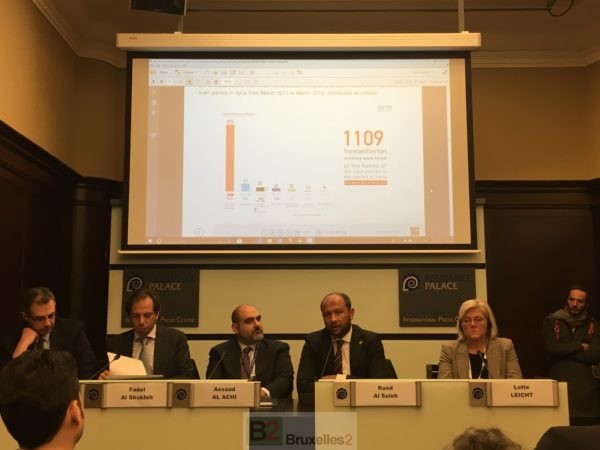Humanitarian workers, privileged target in Syria
(B2) By directly targeting humanitarian workers, Bashar al-Assad's armed forces want to prevent them from helping the civilian population. Faced with human rights violations, only one weapon: the law

Several representatives of aid workers denounced, in Brussels on Wednesday (March 13), what has become the norm in the conflict in Syria: the normalization of human rights violations by the regime. " Iit is urgent to intervene " in front of " impunity with which these acts are committed, they warn.
For aid workers, there is no longer a safe place
Anyone who wishes to help, rescue finds himself in very great danger, killed or arrested at the slightest opportunity. With all these attacks, there is no safe place” for no one, neither for the humanitarian workers nor for the displaced. " No secure environment ". Any weapon is allowed, be it chemical weapons, detentions, cyber attacks, disinformation to undermine their credibility.
185 doctors killed since the beginning of the conflict
According to Mohamad Katoub, member of the Syrian American Medical Society “ 16 aid workers are [now] detained in northwest Syria, and we have no information to help them ". Worse still, 185 doctors were killed by the regime.
1463 attacks on humanitarian facilities
The White Helmets (1) are at the top of the list of targets targeted by Russian forces, the Iranian military or even the military forces of the Syrian regime, according to testimony. The state of play is tragic, warns Fadel Al Shukfeh. " 1109 aid workers are targeted in Syria, more than in any other country. They are constant targets. " We recense " at least 1463 attacks on vital humanitarian installations ". Not to mention the " 3984 people in detention centers », including humanitarian workers, doctors, civil aid. All this since the beginning of the movement.
Hospitals have become a dangerous place
Several recently attacked hospitals had to be evacuated or secured. The Barda Center was one of the targets, killing dozens. " Directly after the first strike, they targeted three public hospitals Sadly recounts Mohamad Katoub. On April 4, the hospital in the city of Al Tabaqa was deliberately hit. Attacks on teachers and schools are becoming frequent, as are tactical population displacements. " It is the same situation in all sectors. People prefer not to keep women too long in hospitals. And you can't have a vaccine campaign at the national level. It would be too dangerous ". " We had to wait until it was less dangerous to move the children ».
Attacks as a message of intimidation
It is a way for the regime warn society by targeting people who try to help or rescue society. "A terrible strategy for civilians, and a" punishment for people helping them. It is a question of making disappear any trace, any testimony, any proof on the violations of the human rights in Syria listed by the White Helmets. Documentation remains, in fact, a weapon to attack those responsible. Faced with the violation of human rights, the only weapon is 'the law' underlines Lotte Leicht, director of Human Rights Watch for the European Union. " With bravery, the surviving victims are fighting in Europe, using European laws that allow for the investigation and prosecution of crimes. So many tools that could one day allow those responsible to be punished.
(Capucine Allais, st)
(1) Humanitarian civil protection organization formed during the Syrian civil war, the White Helmets have been working since 2012. Raed Al Saleh, head of the White Helmets, specifies that currently 3000 volunteers are working in sensitive areas in Syria.


